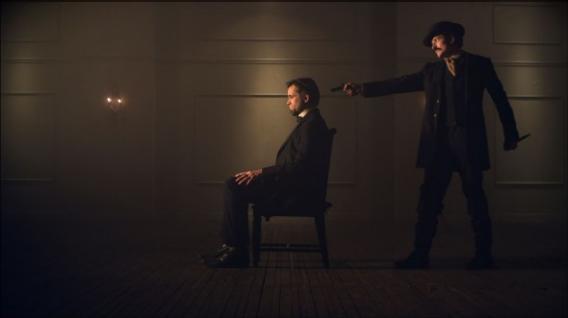The grabby title of National Geographic channel’s first original docudrama, which premieres this Sunday, is Killing Lincoln. A more accurate title would be Spending Too Much Time With John Wilkes Booth.
The production, based on a book by Bill O’Reilly and Martin Dugard—which, according to a review in North & South, the magazine of the Civil War Society, “contains numerous errors of people, places, and events”—has a peculiar hybrid structure. From time to time, the camera cuts away from the floridly bearded, amply petticoated people of 1865 to a set in what appears to be an abandoned furniture warehouse. Here, from a perch alongside a tiny table, Tom Hanks supplies contemporary viewers with historical context. In his first appearance, Hanks warns that “John Wilkes Booth is reduced by history to a two-dimensional scoundrel and dismissed as a madman.” The film then proceeds to turn him into a one-dimensional scoundrel (and a madman).
Booth (Jesse Johnson), who was, famously, a thespian himself, is appropriately actorly; Everything he says sounds like a Shakespearean soliloquy, every gesture is exaggerated and stagey. But other than a sentence or two about states’ rights and Southern rights, no explanation is given for his intense hatred for Lincoln. Well, he is a racist. While attending Lincoln’s speech on April 11, 1865, in which the president observes that it is “unsatisfactory to some that the elective franchise is not given to the colored man,” Booth acts like a high-school bully, slouching against a wall, mumbling to his buddies “that means nigger citizenship.” (A notice that appears before the credits warns that “This program contains strong language including racial slurs in historical context,” but “the n-word” is the only example of “strong language” that I noticed. It seems strange that this one derogatory and offensive term should be the sole attempt at authentic speech.)
Billy Campbell is the actor unfortunate enough to be cast as the 16th president at a time when Daniel Day-Lewis’ star turn in Lincoln is so fresh in movie-goers’ minds. Campbell has played charismatic leaders (such as The 4400’s Jordan Collier) and complicated politicians (like The Killing’s Darren Richmond) before. I’m not sure that’s adequate preparation to play the Great Emancipator, but it’s a testimony to Campbell’s contemplative performance that what little life the movie has drains away once John Wilkes Booth shoots the president.
Unfortunately, at that point, Killing Lincoln still has an hour or so to run.
